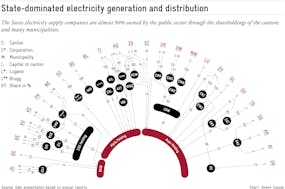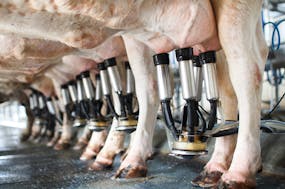As early as 2006, Switzerland and the US were about to open official negotiations for a free trade agreement. This historical review of the events of that time tries to explain how another rejection of official negotiations can be avoided on the Swiss side.
Phase 1: The first, failed attempt
In July 2005, during the administration of U.S. President George W. Bush, close bilateral trade relations between Switzerland and the U.S. culminated in exploratory talks on a possible Free Trade Agreement (FTA). However, Swiss Prime Minister Joseph Deiss’ request to open official negotiations in January 2006 was rejected by the Federal Council and an agreement between the two partner countries remained a long way off.
The rejection by the Federal Council was preceded by five parliamentary initiatives which yielded critical assessments of the potential FTA. The main topic was the protection of the Swiss agricultural sector from imports from the USA. After the rejection of talks by the Federal Council, individual parliamentarians tried to revive the debate with several initiatives, but by 2008 the topic had finally disappeared from the political agenda (see figure).

Phase 2: Feared effects of the TTIP
It was not until 2012 that a new dynamic emerged, driven first by Swiss interest in protecting geographical indications of origin for cheese, and from 2013 onwards by a potential agreement between the USA and the EU (see illustration). The Transatlantic Trade and Investment Partnership (TTIP) would not have included Switzerland. The mutual tariff reduction between the EU and the U.S. would have led to an estimated GDP decline of 0.5% in Switzerland due to the trade-divisive effects and the consequences of more restrictive rules of origin for Swiss exporters (World Trade Institute 2014, Balestieri 2014). The TTIP was originally supposed to be concluded at the end of 2015, but was derailed by civil protests in the EU (keyword “Chlorhühnchen“) and then the change of U.S. Presidency. Officially, the talks are paused, but they could be resumed at any time.
Phase 3: Another “window of opportunity”
A third phase in the political environment emerged beginning in 2018 (see figure). Since autumn 2018, the two countries have again been engaged in exploratory talks (WBF 2019) to find out whether the conditions are right for official negotiations, 13 years after the first failed attempt. One important reason for this renewed attempt is the Trump Administration’s desire to accelerate the completion or improvement of bilateral trade agreements. However, the upcoming presidential elections in the U.S. will soon close the window of opportunity for formal negotiations.
The analysis of parliamentary initiatives — as a reflection of public debate — shows that the votes in favor of an FTA were strongest when Switzerland was under pressure to seek a solution with the United States as a result of the TTIP negotiations. On the other hand, rejections were most common when it came time to talk about the specific contents of an FTA.
Swiss agricultural sector as a stumbling block
The divergent interests of Switzerland and the USA with regard to agricultural liberalization were one of the biggest stumbling blocks in 2006. It is not surprising that the agricultural sector plays a dominant role in the political debate. For example, at least 33 national or state councils are regularly involved in agriculture (13.4% of all parliamentarians), including 15 farmers (6.1%) (Dümmler and Roten 2018). Compared to its economic importance, the agricultural sector (with 3.1% of total employees, and a value added share equal to only 0.7% of GDP) is heavily overrepresented in the Swiss parliament.
However, not only agricultural stakeholders have voiced opposition. Opposition also emerged from the green side due to environmental and social concerns (Greens 2005 and Parliamentary Services 2019a). The focus was on the generally higher standards in Switzerland with regard to environmental, consumer, animal and social protection (Parliamentary Services 2019b).
Inclusion of the various interest groups — but no blocking power
What needs to be done to prevent a new FTA with the US from failing at an early stage, as in 2006? Probably the most important lesson from 2006 is the need for early inclusion — beginning during the exploratory talks — of various interest groups, in particular agriculture, consumers and environmental organizations. As far as possible, common solutions and positions should be developed.
The inclusion of relevant interest groups is central, but must not lead to them being granted veto power. Similarly, no concessions should be made to domestic actors that go beyond the true cost of adaptation to an FTA. A sector such as Swiss agriculture, which already receives billions in tax and consumer price benefits, should not be allowed additional privileges.
Solutions for a step by step opening
In order to make concessions in the agricultural sector vis-à-vis the USA, there are various approaches that Switzerland should use to avoid rejection of the FTA at home as well as in negotiations with the U.S. The options include:
- Several years of transitional periods for market opening. Around 56% of farmers today are over 50 years old (FSO 2019) and would hardly be affected by a partial market opening during long transitional periods;
- the granting of a limited, additional quota to the USA for duty-free imports to Switzerland;
- targeted tariff reductions for certain agricultural products as a concession, for which sensitive products are excluded from free trade for Switzerland (for the time being);
- differentiation at the product level, e.g. free trade in processed corn products instead of unprocessed corn;
- the extension of unmanaged periods in the three-phase system (seasonal border management) for fruits and vegetables (see Swisscofel 2018 ).
Basic requirements for an agreement are there
Basically, a free trade agreement should succeed. Switzerland and the USA largely share the same basic values regarding the rule of law, freedom, democracy and the market economy. The issues of human rights, working conditions, wages and environmental compliance are of minor importance compared to some FTA negotiations, for example with Asian countries. If an agreement is reached, both countries can benefit significantly from a FTA. The historic opportunity is therefore crucial to use — the two nations should not wait another 13 years.
Further Information: «Win-win: Swiss – US Free Trade».





